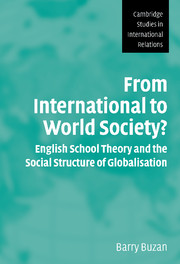 From International to World Society?
From International to World Society? Book contents
- Frontmatter
- Contents
- List of figures and tables
- Preface
- List of abbreviations
- Glossary
- Introduction
- 1 English school theory and its problems: an overview
- 2 World society in English school theory
- 3 Concepts of world society outside English school thinking
- 4 Reimagining the English school's triad
- 5 Reconstructing the pluralist–solidarist debate
- 6 The primary institutions of international society
- 7 Bringing geography back in
- 8 Conclusions: a portrait of contemporary interstate society
- List of references
- Index
- CAMBRIDGE STUDIES IN INTERNATIONAL RELATIONS
5 - Reconstructing the pluralist–solidarist debate
Published online by Cambridge University Press: 14 January 2010
- Frontmatter
- Contents
- List of figures and tables
- Preface
- List of abbreviations
- Glossary
- Introduction
- 1 English school theory and its problems: an overview
- 2 World society in English school theory
- 3 Concepts of world society outside English school thinking
- 4 Reimagining the English school's triad
- 5 Reconstructing the pluralist–solidarist debate
- 6 The primary institutions of international society
- 7 Bringing geography back in
- 8 Conclusions: a portrait of contemporary interstate society
- List of references
- Index
- CAMBRIDGE STUDIES IN INTERNATIONAL RELATIONS
Summary
On the basis of the arguments in chapter 4, and the progressive revisions to the English school's three pillars, I can now return to the pluralist–solidarist debate. In chapter 2, I argued that pluralism and solidarism should be understood not as mutually exclusive positions, but as positions on a spectrum representing, respectively, thin and thick sets of shared norms, rules and institutions. The basic differentiation between thin and thick was qualified by some discussion about the nature of the values shared, with pluralism associated with rules about coexistence, and solidarism potentially extending much beyond that. I used Bull's ideas about rules of cooperation and the centrality of positive international law to question the reasons behind his pluralism, arguing that these can be seen also as a powerful key to an understanding of solidarism wider than the one Bull himself employed. I argued against basing solidarism on cosmopolitanism, because that approach confines its meaning to a narrow band largely occupied by human rights and therefore excludes much that is of great empirical and theoretical significance to the concept. I also argued for allowing solidarism to be a feature of interstate societies, and not using it as a vehicle to imply some necessary conflation between international and world society.
In this chapter, I want to pick up these arguments and examine them in more detail.
- Type
- Chapter
- Information
- From International to World Society?English School Theory and the Social Structure of Globalisation, pp. 139 - 160Publisher: Cambridge University PressPrint publication year: 2004


